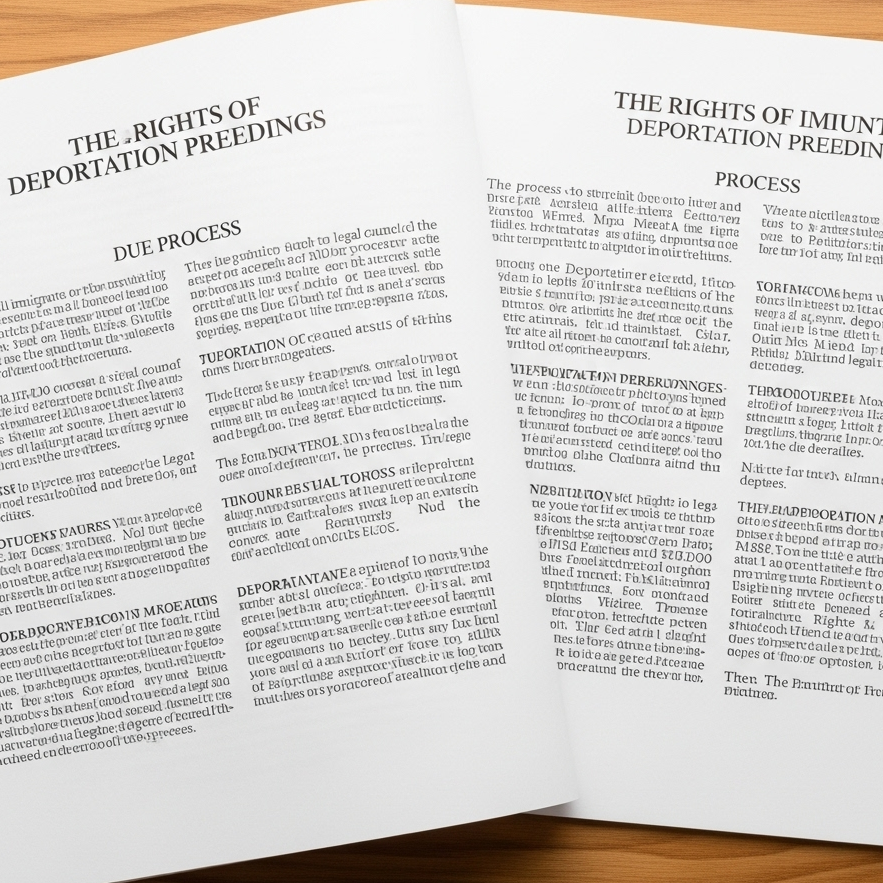The landscape of US immigration is dynamic and complex, particularly concerning US deportations. As of February 28, 2025, and continuing, the United States has seen over 26,700 foreign nationals deported, reflecting intensified immigration enforcement efforts. This article aims to provide a clear, comprehensive, and empathetic guide to understanding the deportation process, your rights, and how to successfully navigate these challenging circumstances.

The recent surge in deportations is a significant development, with reports indicating a dramatic rise in removals, including a notable increase in the deportation of non-criminal immigrants. For instance, data from US Immigration and Customs Enforcement (ICE) shows over 271,000 individuals removed in the first quarter of 2025, a significant increase from previous years and the highest in nearly a decade, according to Hindustan Times. This aggressive stance by the current administration highlights the critical need for foreign nationals and their families to be informed and prepared.
As a seasoned writer on this topic, I’ve seen firsthand how unsettling and confusing these developments can be. My goal is to equip you with practical, encouraging information to understand and successfully navigate the process surrounding US deportations. It’s crucial to remember that while the situation may feel daunting, understanding your rights and seeking appropriate legal counsel can make a profound difference.
Understanding the Landscape of US Deportations
Deportation, formally known as removal, is the process by which a foreign national is expelled from the United States. This can occur for various reasons, including visa violations, overstaying an authorized period, or criminal acts. The process is a civil, not criminal, proceeding, though certain policies, like the Trump administration’s “Zero-Tolerance Policy,” have led to criminal prosecutions for illegal border crossings, which then may involve criminal legal counsel in addition to immigration representation.
The increase in US deportations in 2025 is part of a broader shift in immigration policy. The current administration has emphasized stringent border control and expanded interior enforcement. This includes a significant rise in interior deportations, with ICE increasing the pace of removal flights, as reported by Time Magazine.
Key Factors Driving Current Deportations
Several factors contribute to the current heightened enforcement:
- Increased Enforcement at the Border: A substantial portion of removals originates from apprehensions at the US-Mexico border, as Customs and Border Protection (CBP) intensifies efforts to deter illegal crossings (Hindustan Times).
- Expanded Interior Enforcement: Beyond border operations, ICE has expanded its focus to include long-term residents, leading to a rise in interior arrests and deportations.
- Policy Shifts: Changes in executive orders and directives, such as the expansion of “expedited removal” to apply anywhere in the country to undocumented individuals who cannot prove continuous presence for two years, significantly impact deportation numbers (NILC).
- Targeting Non-Criminal Immigrants: A notable change is the increased deportation of individuals without criminal convictions, with some reports indicating a 334% jump in such cases (Hindustan Times).
Your Rights During Immigration Enforcement
Navigating immigration enforcement can be intimidating, but knowing your rights is your strongest defense. The U.S. Constitution provides certain protections to all individuals within its borders, regardless of immigration status.
- Right to Due Process: This fundamental right ensures fair and impartial treatment before the government can take away your life, liberty, or property. While expedited removal processes can limit this, in most deportation cases, you have the right to appear before an immigration judge (Clearwater Law Group).
- Right to Legal Counsel: While the government is not always required to provide an attorney in civil deportation proceedings, you have the right to seek and retain legal counsel. Studies show that individuals with lawyers are significantly more likely to achieve a positive outcome in their immigration cases (The IRC).
- Right to Remain Silent: You have the right to refuse to answer questions from immigration officers beyond confirming your identity. You do not have to discuss your immigration status, country of origin, or how you entered the U.S.
- Right Against Unreasonable Searches and Seizures: Immigration officers generally cannot enter your home without a warrant signed by a judge or your consent.
- Right to Challenge Detention: You have the right to challenge your detention through a habeas corpus petition, ensuring your imprisonment is not arbitrary or unlawful (The IRC).

The Deportation Process: What to Expect?
The deportation process typically begins with an arrest by ICE or CBP. What follows can vary significantly depending on individual circumstances and the type of removal proceedings initiated.
Stages of the Removal Process
- Arrest and Detention: Following an arrest, individuals are often detained in an immigration detention center. ICE provides data on the number of detainees, which can fluctuate. As of June 15, 2025, ICE held 56,397 individuals in detention (TRAC).
- Notice to Appear (NTA): This document formally charges a foreign national with being deportable and initiates removal proceedings before an immigration judge.
- Immigration Court Proceedings: This is where your case will be heard. You, or your attorney, will present evidence and arguments to an immigration judge. Potential outcomes include being granted relief from removal (e.g., asylum, cancellation of removal, or adjustment of status) or receiving a removal order.
- Appeal: If the immigration judge orders your deportation, you generally have the right to appeal the decision to the Board of Immigration Appeals (BIA) and, in some cases, to federal courts.
- Removal: If all appeals are exhausted and a final order of removal is issued, ICE will arrange for your physical removal from the United States.
It’s important to note that “expedited removal” bypasses the immigration court process, allowing for quicker deportations for certain individuals, typically those apprehended near the border or who cannot prove prolonged continuous presence in the U.S. (NILC).
Seeking Legal Assistance
Given the complexities of immigration law and the high stakes involved, securing qualified legal representation is paramount. An experienced immigration attorney can
- Explain Your Rights: Clearly outline your constitutional and statutory rights throughout the process.
- Evaluate Your Case: Determine if you have any forms of relief available to you that could allow you to remain in the U.S., such as asylum, cancellation of removal, or adjustment of status.
- Represent You in Court: Advocate on your behalf before an immigration judge and, if necessary, in appeals.
- Navigate Bureaucracy: Handle complex paperwork and deadlines.

Many non-profit organizations and legal aid societies offer free or low-cost immigration legal services. The Legal Aid Society, for instance, provides urgent legal services to low-income immigrants. You can often find local resources by searching online for “legal aid for deportation cases [your city/state]”.
Proactive Steps and Preparation
While facing potential deportation is undoubtedly stressful, taking proactive steps can help.
- Know Your Documents: Keep copies of all important immigration documents, such as passports, visas, I-94 records, and any evidence of your continuous presence in the U.S. This could include mail with postmarks, signed leases, or school records (NILC).
- Create an Emergency Plan: If you have family, especially U.S. citizen children, create a plan for their care and guardianship in case of detention or deportation.
- Consult an Attorney Early: If you have any concerns about your immigration status or potential deportation, seek legal advice immediately. Do not wait for an encounter with immigration officials.
- Be Aware of Your Surroundings: While you have rights, it’s wise to be mindful of your interactions with law enforcement and immigration officials.
A relevant social media post that could highlight community support or legal advice
Australia Work Visa Eligible Skill Shortage Jobs in High Demand in June 2025
Navigating Your UK Visa Journey: Insights from May/June 2025 Data
FAQ
Q1: What is the primary reason for the increase in US deportations recently?
The increase is largely attributed to heightened enforcement at the US-Mexico border and an expansion of interior enforcement operations, including a focus on non-criminal immigrants, under current administration policies.
Q2: Do foreign nationals have rights if they are detained by ICE?
Yes, all individuals in the U.S., regardless of immigration status, have constitutional rights, including the right to due process, the right to remain silent, and the right to seek legal counsel.
Q3: How can I find legal assistance if I or someone I know is facing deportation?
You can contact local legal aid societies, non-profit organizations specializing in immigration law, or search for private immigration attorneys in your area. Organizations like The Legal Aid Society often provide assistance to low-income immigrants.
Q4: What is “expedited removal,” and how does it differ from standard deportation proceedings?
Expedited removal allows the government to quickly deport certain individuals without a hearing before an immigration judge, typically those apprehended near the border or who cannot prove continuous presence in the U.S. for two years. Standard proceedings involve a formal court process.
Q5: Can I be deported if I have a pending immigration application?
It depends on the type of application and your specific circumstances. Having a pending application does not automatically protect you from deportation. It is crucial to consult with an immigration attorney to understand how your application impacts your risk of deportation.






